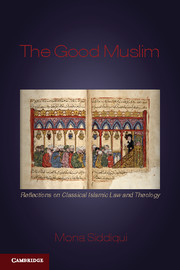Book contents
- Frontmatter
- Contents
- Acknowledgements
- Introduction
- 1 Spoken, Intended, and Problematic Divorce in Hanafī Fiqh
- 2 Between Person and Property: Slavery in Qudūrī’s Mukhtaṣar
- 3 Pig, Purity, and Permission in Mālikī Slaughter
- 4 Drinking and Drunkenness in Ibn Rushd
- 5 Islamic and Other Perspectives on Evil
- 6 The Language of Love in the Qur’ān
- 7 Virtue and Limits in the Ethics of Friendship
- Glossary
- Bibliography
- Index
6 - The Language of Love in the Qur’ān
Published online by Cambridge University Press: 05 July 2012
- Frontmatter
- Contents
- Acknowledgements
- Introduction
- 1 Spoken, Intended, and Problematic Divorce in Hanafī Fiqh
- 2 Between Person and Property: Slavery in Qudūrī’s Mukhtaṣar
- 3 Pig, Purity, and Permission in Mālikī Slaughter
- 4 Drinking and Drunkenness in Ibn Rushd
- 5 Islamic and Other Perspectives on Evil
- 6 The Language of Love in the Qur’ān
- 7 Virtue and Limits in the Ethics of Friendship
- Glossary
- Bibliography
- Index
Summary
He who would know the Secret of both Worlds will find that the Secret of them both is love – Attar.
Before all things, before the creation, before his knowledge of the creation, God in his unity was holding an ineffable discourse with himself and contemplating the splendour of His essence in itself. That pure simplicity of his self admiration is Love, which in his essence is the essence of the essence, beyond all limitations of attributes. In his perfect isolation God loves Himself, praises Himself, and manifests Himself by Love. And it was this first manifestation of Love in the Divine Absolute that determined the multiplicity of His attributes, and His names. Then God by His essence in His essence desired to project out of Himself His supreme joy, that Love in aloneness, that he might behold it and speak to it. He looked in eternity and brought forth from non-existence an image, an image of Himself, endowed with all the attributes and all His names: Adam. He created Adam in His own image, thus the human became the place of His manifestation.
A question I have often asked myself is how did Islam come to be seen as a religion of law and Christianity a religion of love? When I read Christian theology, the word love is manifest in diverse ways and seems pivotal to any understanding of the divine being; God as love and God’s unconditional love lie at the heart of Christian thought. In Islamic thought, other than in Ṣūfī literature, the love rhetoric has been virtually eclipsed by the rhetoric of obedience as the discussions around law gradually took pre-eminence in Islam’s intellectual heritage as well as in popular piety. Even amongst the Ṣūfīs, systematic theories of divine love did not develop in early Islamic mysticism. There are few works that provide a complete theory of divine love.
- Type
- Chapter
- Information
- The Good MuslimReflections on Classical Islamic Law and Theology, pp. 137 - 166Publisher: Cambridge University PressPrint publication year: 2012



